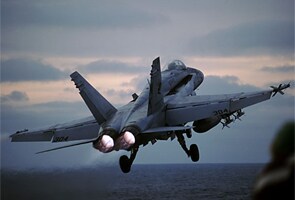
Virginia:
The US Air Force awarded a 35 billion US dollar contract to build the next generation of air refueling planes to Chicago-based Boeing Co. on Thursday, delivering a major economic boost to Washington state and Kansas and likely ending nearly a decade-long struggle to replace its fleet of Eisenhower-era tanker aircraft.
"What we can tell you was that Boeing was a clear winner," Deputy Defence Secretary William Lynn said in announcing the decision at the Pentagon.
The decision was a surprise as defence analysts and even some lawmakers had expected European Aeronautic Defence and Space Co. (EADS) to capture the contract.
It was a blow to Alabama, which had been counting on EADS to assemble the aircraft at a long-shuttered military base in Mobile.
Production is set to take place in Everett, Washington, Wichita, Kansas, and dozens of other states.
Boeing has said the contract will mean some 50-thousand jobs.
Lawmakers who had lobbied for the contract were very pleased by the news.
Replacing the 1950s-era KC-135 planes - the equivalent of a flying petrol station - is crucial for the military.
Pilots who weren't even born when the last KC-135 was delivered in 1965 are operating air tankers that the Pentagon is struggling to keep in flying shape.
The refueling tankers allow jet fighters, supply planes and other aircraft to cover long distances, critical today with fewer overseas bases and with operations under way far from the United States in places like Iraq and Afghanistan.
The 35 billion US dollar contract calls for producing 179 new tankers.
Boeing would base the tanker on its 767 aircraft.
The 35 billion could end up being a first installment on a 100 billion US dollar deal if the Air Force decides to purchase more aircraft.
Through the years, the Air Force's efforts to award the contract have been undone by Pentagon bungling and the criminal conviction of a top Defence Department official.
Initially, the Air Force planned to lease and buy Boeing planes to serve as tankers, but that fell through.
The Air Force later awarded a contract to Northrop Grumman Corp. and EADS, but in 2008 the Government Accountability Office (GAO) upheld Boeing's protest of the contract.
The GAO said it found "a number of significant errors" in the Air Force's decision, including its failure to fairly judge the relative merits of each proposal.
The Air Force reopened the bidding in 2010 only to be embarrassed again as it mistakenly gave Boeing and EADS sensitive information that contained each other's confidential bids.
The contract has generated some of the fiercest and costliest lobbying in Washington. The two companies have spent millions on advertising, including radio and subway ads in the nation's capital, and hired dozens of lobbyists.
In the past year, Boeing has spent five million US dollars on print advertising to promote its version of the tanker while EADS has shelled out 1.7 million US dollars to boost its prototype, according to Evan Tracey, president of the Campaign Media Analysis Group, which typically monitors advertising for political campaigns.
"What we can tell you was that Boeing was a clear winner," Deputy Defence Secretary William Lynn said in announcing the decision at the Pentagon.
The decision was a surprise as defence analysts and even some lawmakers had expected European Aeronautic Defence and Space Co. (EADS) to capture the contract.
It was a blow to Alabama, which had been counting on EADS to assemble the aircraft at a long-shuttered military base in Mobile.
Production is set to take place in Everett, Washington, Wichita, Kansas, and dozens of other states.
Boeing has said the contract will mean some 50-thousand jobs.
Lawmakers who had lobbied for the contract were very pleased by the news.
Replacing the 1950s-era KC-135 planes - the equivalent of a flying petrol station - is crucial for the military.
Pilots who weren't even born when the last KC-135 was delivered in 1965 are operating air tankers that the Pentagon is struggling to keep in flying shape.
The refueling tankers allow jet fighters, supply planes and other aircraft to cover long distances, critical today with fewer overseas bases and with operations under way far from the United States in places like Iraq and Afghanistan.
The 35 billion US dollar contract calls for producing 179 new tankers.
Boeing would base the tanker on its 767 aircraft.
The 35 billion could end up being a first installment on a 100 billion US dollar deal if the Air Force decides to purchase more aircraft.
Through the years, the Air Force's efforts to award the contract have been undone by Pentagon bungling and the criminal conviction of a top Defence Department official.
Initially, the Air Force planned to lease and buy Boeing planes to serve as tankers, but that fell through.
The Air Force later awarded a contract to Northrop Grumman Corp. and EADS, but in 2008 the Government Accountability Office (GAO) upheld Boeing's protest of the contract.
The GAO said it found "a number of significant errors" in the Air Force's decision, including its failure to fairly judge the relative merits of each proposal.
The Air Force reopened the bidding in 2010 only to be embarrassed again as it mistakenly gave Boeing and EADS sensitive information that contained each other's confidential bids.
The contract has generated some of the fiercest and costliest lobbying in Washington. The two companies have spent millions on advertising, including radio and subway ads in the nation's capital, and hired dozens of lobbyists.
In the past year, Boeing has spent five million US dollars on print advertising to promote its version of the tanker while EADS has shelled out 1.7 million US dollars to boost its prototype, according to Evan Tracey, president of the Campaign Media Analysis Group, which typically monitors advertising for political campaigns.
Track Latest News Live on NDTV.com and get news updates from India and around the world

